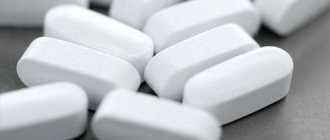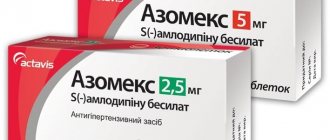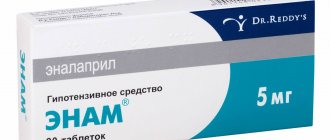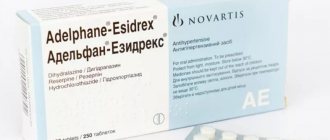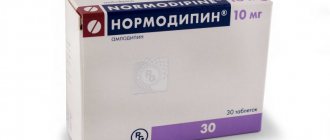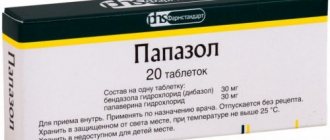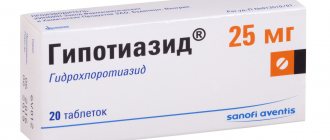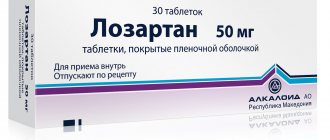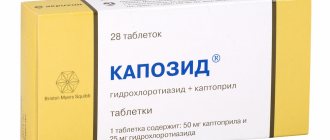Brief information about the drug
The blood pressure drug Coronal belongs to the pharmacological group of beta-blockers. Helps normalize blood pressure (BP), heart rate, and improves the quality of life of patients suffering from hypertension. Produced in Czech.
Release form
The blood pressure medicine Coronal is available in a tablet form that is convenient for use and dosage. The medicine is sold in packages containing 1, 3, 6, or 10 blisters (10 tablets each).
Packaging of Coronal tablets
Composition of the drug
The main active component of the drug is bisoprolol, presented in a dosage of 5 mg or 10 mg. The tablets also contain auxiliary ingredients: microcrystalline cellulose, starch, magnesium stearate, anhydrous colloidal silicon dioxide, sodium lauryl sulfate.
pharmachologic effect
Coronal for high blood pressure is a selective beta-blocker that has a pronounced antihypertensive effect.
Terms and conditions of storage
The maximum shelf life of the drug is 3 years. The tablets should be stored in a shaded and cool place, inaccessible to children and pets.
Terms of sale
You can purchase the drug in pharmacy chains only if you have an appropriate prescription from your doctor.
Price of tablets
The price of the drug depends on factors such as the dose of the main active ingredient and the number of tablets in the package. The estimated cost of Coronal varies from 120 to 220 rubles, for 20 capsules.
Indications for use of Coronal
Beta blockers are one of the oldest groups of cardiac drugs among those that have managed to remain relevant to this day. Since the 1960s, they have been used in clinical practice as an emergency treatment with antiarrhythmic effects. Since then, their indications for use have expanded significantly. Now they include most cardiovascular pathologies, including high blood pressure. Among the most studied and guaranteed safe beta-blockers, a special place is occupied by bisoprolol and drugs with a similar mechanism of action, atenolol and metoprolol.
The original drug bisoprolol is produced by the pharmaceutical company Merck under the brand name Concor. Among the generics of Concor, Coronal has gained the greatest popularity in Russia. This medicine has the same active ingredient in the same dosages as the original Concor. Coronal is produced by the international company Zentiva, which specializes in generics. The active ingredient (bisoprolol fumarate) is purchased in Spain and India. The tablets are manufactured and undergo quality control at the Zentiva plant in Slovakia. The instructions for use indicate 2 main indications for Coronal: hypertension and the prevention of angina pectoris, which is accompanied by pain and heaviness in the sternum, with ischemic heart disease (coronary heart disease).
What does Coronal help with:
- The reason for using the drug for ischemic heart disease is its antianginal effect. Coronal reduces the pulse rate, reduces myocardial contractility, and increases the volume of blood passing through the coronary vessels. According to one study (1995, 161 patients with coronary artery disease), taking Coronal for a month can reduce the frequency of angina attacks by 60%. The effect of the drug is around the clock and extends to attacks that occur at night or early in the morning at rest. The use of Coronal for a year leads to a decrease in the frequency of hospitalizations, a decrease in the risk of heart attack, and reduces the need for coronary bypass surgery.
- For hypertension, Coronal tablets are used because of their ability to reduce cardiac output, renin synthesis and vascular resistance, and increase the release of substances that relax the walls of blood vessels (nitric oxide, prostaglandins). Taking Coronal in a dose of 5 mg allows normalizing blood pressure in 76% of patients, 10 mg in 94% of patients. The average reduction in blood pressure that can be expected with 3 months of use of Coronal:
| Dosage, mg | Decrease in pressure, mm Hg. | |
| systolic | diastolic | |
| 5 | 15 | 10 |
| 10 | 25 | 15 |
| 20 | 30 | 20 |
According to therapists, Coronal gives the best results in patients with hypersympathicotonia. In addition to high blood pressure, they often experience tachycardia, decreased sweating, increased dryness of mucous membranes, and dilated pupils.
- With long-term use, Coronal and its analogues prevent the progression of heart failure, reduce the severity of its symptoms, and reduce mortality by a third. For heart failure, bisoprolol is indicated for 70% of patients, and in relatively high doses.
- Coronal is prescribed for arrhythmias instead of cardiac glycosides and calcium antagonists. One study showed that when taking bisoprolol, the recurrence rate of arrhythmias is 42% of the original, and the heart rate is controlled not only at rest, but also during exercise.
- Coronal may be prescribed to prevent cardiovascular complications during surgery. Taking pills begins a week before surgery and continues for a month after it.
Pharmacodynamics: increases or decreases blood pressure
Coronal blood pressure tablets are characterized by the presence of hypotensive, antianginal and antiarrhythmic properties. By suppressing the production of cyclic AMP from adenosine triphosphate, Coronal reduces blood pressure.
The drug stabilizes the pulse and heart rhythm, significantly reduces the oxygen demand of the heart muscle and myocardium.
The drug belongs to the group of beta-blockers
Composition of the drug
The main component of the drug is the active substance bisoprolol fumarate 5/10 mg. In addition, “Coronal” includes auxiliary components, the core consists of:
- Fine crystalline cellulose;
- Corn starch;
- Lauryl sulfate;
- Silica;
- Magnesium stearate.
Components of the drug shell:
- Hypromellose;
- Silica;
- Macrogol 400;
- Fe oxide yellow;
- Fe oxide is red.
The medicine is available in two dosages
What does Coronal help with?
Doctors strongly recommend drinking Coronal for high blood pressure in patients who have the following indications for the use of this drug:
- Arterial hypertension;
- Sinus tachycardia;
- Ischemic disease;
- Angina pectoris;
- Extrasystole of the cardiac ventricle;
- Hypertonic disease;
- Mitral valve prolapse;
- Arrhythmia that occurs against the background of thyrotoxicosis.
Tablets are also often prescribed to patients who have suffered a myocardial infarction in order to prevent relapses of the disease and associated complications.
special instructions
The use of Coronal should be accompanied by regular monitoring of heart rate (HR) and blood pressure, at the beginning of therapy - daily, then - once every 3-4 months, at least once every 4-5 months an electrocardiogram should be done and laboratory tests should be performed to determine the patients with diabetes mellitus blood glucose levels. Elderly patients are recommended to check their kidney function once every 4-5 months.
When prescribing the drug, the doctor must teach the patient to independently calculate heart rate and warn about the need for mandatory medical consultation in case of heart rate below 50 beats per minute.
Patients with a history of bronchial or pulmonary pathology should undergo an examination of external respiratory function when prescribing the drug.
In 20% of patients with angina pectoris, the use of beta-blockers may not achieve a therapeutic effect, and in smoking patients their effect is reduced.
Patients using contact lenses should take into account the decrease in tear production during the treatment period.
With pheochromocytoma, paradoxical arterial hypertension may develop while taking Coronal.
If depression develops, it is recommended to discontinue use of the drug.
Abrupt interruption of treatment is contraindicated due to the risk of myocardial infarction and severe arrhythmias. Cancellation should be carried out for 2 weeks or more, reducing the intake by 1/4 of the prescribed dose every 3-4 days.
Bisoprolol is able to mask tachycardia and other characteristic clinical signs of thyrotoxicosis. It is contraindicated to abruptly discontinue the drug in patients with thyrotoxicosis, as this may cause an increase in the symptoms of the disease.
In patients with diabetes mellitus, the drug does not enhance hypoglycemia caused by insulin and does not delay the process of restoration to normal blood glucose levels.
When used concomitantly, clonidine should be discontinued several days after stopping the drug.
For planned surgery, the drug should be discontinued 48 hours before the start of general anesthesia. When performing an emergency operation on a patient who has already taken the drug, a drug with minimal negative inotropic effect should be used for general anesthesia.
To conduct studies to determine the level of concentration in urine and blood titers of antinuclear antibodies, normetanephrine, catecholamines, vanillylmandelic acid, the use of the drug should be discontinued in advance.
When Coronal is combined with drugs that reduce catecholamine reserves (reserpine), there is a risk of bradycardia or a pronounced decrease in blood pressure, therefore, if this combination is necessary, the patient should be under close medical supervision.
With a burdened allergy history, there is a risk of increased severity of the hypersensitivity reaction and the absence of the effect of usual doses of epinephrine. To eliminate reciprocal activation of the vagus nerve, intravenous (IV) administration of 1-2 mg of atropine is indicated.
Reducing the dose or discontinuing treatment in elderly patients should be done in the case of a pronounced decrease in blood pressure (systolic - below 100 mmHg), increasing bradycardia (less than 50 beats per minute), or AV block.
During the period of use of the drug, patients are advised to be careful when driving vehicles and machinery or performing other potentially dangerous activities that require high concentration and speed of psychomotor reactions.
For whom is it contraindicated?
Medical specialists strictly prohibit taking Coronal for high blood pressure in patients who have the following clinical contraindications:
- Hypotonic disease (blood pressure readings from 100 mmHg and below);
- Slack sinus syndrome;
- Raynaud's disease;
- Bradycardia (slow heartbeat, severe);
- Individual intolerance and hypersensitivity to the components contained in the tablets;
- Shock state of cardiogenic or any other nature;
- Bronchial asthma;
- Heart failure occurring in acute form;
- Blockade of a sinoarterial nature;
- Chronic form of heart failure occurring in the stage of decompensation;
- Severe disturbance of peripheral circulatory processes;
- Cardiomegaly.
Tablets are not used to treat pregnant women, mothers, during breastfeeding, children and adolescents under age.
Coronal is contraindicated in bronchial asthma
Instructions for use and dosage
Instructions for use of Coronal recommend consuming the tablets as a whole, without preliminary chewing or crushing. The most pronounced therapeutic effect is achieved if you take the medicine in the morning, half an hour before breakfast.
The recommended initial dosage of the drug is 2.5 mg throughout the day. Gradually, the daily dose of tablets increases to 5 mg, and then to 10 mg.
The maximum permissible daily dosage of the drug should not exceed 20 mg, and if we are talking about patients with diagnosed renal and hepatic pathologies, then 10 mg.
The duration of the therapeutic course is determined by the doctor individually, taking into account such factors as the exact diagnosis, stage of the pathological process, age category and general health of the patient, the body’s reaction to the proposed treatment and other features of a particular clinical case!
Pharmacological properties of the drug Coronal
bisoprolol fumarate (INN - bisoprololum - bisoprolol) is a selective β1-adrenergic receptor blocker without BCA and membrane stabilizing activity. It has a hypotensive and antianginal effect. The duration of action (24 hours) is achieved due to the pharmacokinetics of the drug (half-life is 10–12 hours). Bisoprolol has high cardioselectivity. Clinical trials have shown that the effectiveness of 10 mg of Coronal is similar to that of atenolol, metoprolol or propranolol at daily doses of 100, 100 and 160 mg, respectively. After oral administration, 90% of the drug is absorbed. 30% of bisoprolol binds to blood plasma proteins. The biological half-life is 10–12 hours. 98% of the drug is excreted in the urine and 2% in feces. 50% of the administered dose is metabolized in the liver to inactive metabolites, which are excreted by the kidneys. The remaining part of the drug is excreted unchanged by the kidneys, as a result of which there is no need to adjust the dose of Coronal in patients with mild to moderate renal failure.
Adverse reactions
When taking Coronal for blood pressure, you must remember that the drug can provoke the following adverse reactions:
- Convulsive syndrome;
- A sharp decrease in blood pressure;
- Muscular and joint pain;
- Diarrhea or constipation;
- Nausea;
- Attacks of vomiting;
- Angiospasms;
- Slow heart rate (bradycardia);
- Hyperemia of the skin;
- Depressive states;
- Attacks of headaches;
- Arthralgia;
- Allergic rashes on the skin like urticaria;
- Manifestations of asthenic syndrome, weakness, decreased ability to work.
In rare cases, there is a weakening of erectile dysfunction in representatives of the stronger sex and the development of withdrawal syndrome. You should inform your doctor about any side effects!
Taking medication may cause depression
Cordarone and alcohol
The compatibility of Cordarone and alcohol is dangerous for the human body. This is due to the fact that combined use leads to such serious consequences as pathologies of the central nervous system, liver, and cardiac arrest. To avoid them, you need to strictly follow your doctor’s recommendations regarding when you can drink alcohol after taking the medicine.
↑ Are you having a problem? Need more information? Type in the form and press Enter!
The drug is indicated for people with severe heart rhythm disorders. When taking ethanol and the drug simultaneously, the pharmacological properties of the latter change and can act in the opposite direction. There is also an increase in side effects.
If you take the medicine while intoxicated, it can lead to complete loss of sensation, loss of coordination, which can cause serious injury.
Therefore, it is not recommended to drink alcohol for the entire period of treatment and for a long time after its completion.
↑
Brief characteristics of the drug
The drug is produced by a French pharmaceutical company for the treatment of vascular and heart diseases, in particular, heart rhythm disorders - arrhythmias. Release form: tablets or solution.
The main active ingredient is amiodarone. In tablets its content is slightly higher (200 mg) than in solution (130 mg). In addition, the tablet form contains lactose monohydrate, corn starch, sodium stearate and silicon dioxide, and the liquid drug contains benzyl alcohol, polysorbate and water for injection.
Indications for use:
- ventricular tachycardia;
- atrial fibrillation;
- ventricular fibrillation;
- parasystole;
- treatment of Chagas myocarditis;
- extrasystole of the atria and ventricles;
- left ventricular dysfunction;
- prevention after a heart attack;
- relief of tachycardia/arrhythmia.
This is a potent medicine and is therefore only available with a doctor's prescription.
These include, for example, individual intolerance to iodine or the active substance - amiodarone, bradycardia, pregnancy and breastfeeding.
Also, you should not use the product for treatment if:
- chronic low blood pressure;
- disturbances in liver function;
- thyroid dysfunction (hypothyroidism or hyperthyroidism);
- age less than 18 years;
- cardiogenic shock.
The main side effects include various disturbances in the functioning of the central nervous system of the body and liver pathologies. The severity depends on the dose of ethanol in the blood.
During treatment with this remedy, it is recommended to avoid contact with direct sunlight. Also, during the period of therapy, it is undesirable to drive vehicles and other dangerous mechanisms.
↑ https://myweak.ru/alkogolizm/lekarstva/kordaron-sovmestimost.html
If a person suffers from alcoholism, then it is better to replace the drug with another medicine. This is due to the fact that combined use can lead to hemorrhages inside the skull, apnea, jaundice, lung intoxication, anemia and liver failure.
In addition, the following symptoms appear: a gradual decrease and then a complete lack of appetite, inflammation of the optic nerve, weakening of taste, difficulty breathing, bradycardia.
↑
Using the drug for a hangover
If the dose of drink was very high, then Cordarone taken during a hangover contributes to damage to the optic nerve (the development of optic neuropathy). With a small dose of ethanol, a person may experience the following symptoms: nausea and vomiting, weakness and malaise, drowsiness, chills, fever, hallucinations.
↑
Consequences of drinking alcohol
Taking them together increases the side effects of the drug. The functioning of the body's systems is disrupted, and the effectiveness of the medicine is significantly reduced.
The consequences of simultaneous use include:
- Bradycardia, ventricular tachycardia.
- Nausea, dizziness, vomiting.
- Acute liver failure, cirrhosis, hepatitis, jaundice.
- Pneumonia, pleurisy, shortness of breath, apnea, bronchospasm.
- Bleeding in the lungs.
- Depression, mental disorders, hallucinations.
- Reduced blood pressure.
- Neuropathy, optic nerve dysfunction, blurred vision.
- Skin rash, alopecia, dermatitis, urticaria.
- Sleep disturbances, myopathy, tremors, migraines.
In addition, the functioning of the thyroid gland is disrupted, which leads to insufficient or excessive production of hormones and destabilization of hormonal levels.
During treatment, it is prohibited to take medications that contain alcohol.
↑
When can you take the drug, after how long
Treatment can begin only after alcohol and its breakdown products are completely eliminated from the body. Depending on the type of alcohol and the amount drunk, it will take from 24 to 48 hours.
↑
When can you drink alcohol if you are taking or have taken the drug?
Despite the fact that the maximum concentration of the active substance in the blood is observed after 4-7 hours, complete elimination of the drug from the body occurs much later.
You need to know how long after you can drink alcohol after completing the course of therapy. Elimination begins only 40 days after administration. This is due to the fact that it takes at least a month for the concentration of amiodarone in the blood to stabilize.
Combining substances is not recommended. This is associated with a high risk of developing severe consequences for the human body, including death. Therefore, it is better not to drink alcohol during treatment and for a long time after its completion. This will significantly increase the chances of a full recovery.
↑
Cordarone and beer
Cordarone and beer do not mix. This is a remedy that eliminates arrhythmia, and ethanol has the opposite effect. The drug will eliminate vasospasm, the coronary arteries will dilate, but ethyl alcohol will enhance this effect. Possible fainting.
During treatment it is forbidden to drink beer. The entry of ethanol into the blood leads to dilation of the walls of blood vessels and a drop in blood pressure. This causes a second attack. The therapeutic effect is reduced.
There is a large load on the liver with the risk of developing hepatitis. The process of neutralizing toxic substances is disrupted.
They spread throughout the tissues, leading to intoxication of the body. The parenchyma begins to be replaced by connective tissue, and jaundice forms.
↑
Organs affected by the toxin
The combined use of pharmacological agents and alcohol has a toxic effect on the internal organs and environments of the body. Alcohol, entering into a chemical reaction with a medicine, leads to poisoning, disrupts physiological processes, enhances or weakens the healing properties of drugs.
The liver suffers more than other organs. She gets hit twice. Many medications have a side effect - hepatotoxicity, destroy cells, and disrupt the physiology of the organ. In the liver, alcohol breaks down to ethanal, a substance 20-30 times more toxic than ethanol, which causes the death of hepatocytes.
Dangerous groups of drugs for the organ in combination with alcohol:
- anti-inflammatory;
- hormonal;
- antibacterial;
- antifungal;
- glucose control agents for diabetes mellitus;
- anti-tuberculosis;
- cytostatics (chemotherapy drugs);
- tranquilizers (anti-epileptic, psychotropic).
In second place among the internal organs exposed to the harmful effects of alcohol together with medications are the heart and vascular system. Strong drinks during drug therapy constrict blood vessels and increase blood pressure. The simultaneous intake of alcohol and chemical substances leads to failure of the myocardium and increases the risk of developing an attack of angina pectoris and a heart attack.
A mixture of ethanol and pharmaceuticals disrupts the quality of the blood and reduces clotting. This is dangerous due to internal bleeding and strokes.
↑
State of the nervous system under the influence of alcohol and drugs
The autonomic nervous system, which is responsible for the coordinated functionality of all internal organs, is no less susceptible to negative influence. Under the influence of toxic substances, a chain reaction occurs, which is manifested by a disorder of the gastrointestinal tract (stomach, pancreas, small intestine), kidneys, and endocrine glands.
↑
Rules for taking medications and alcohol
Drinking alcohol during treatment minimizes the clinical effect of therapy and creates a risk of developing complications of the disease.
If this cannot be avoided, follow the rules of behavior that will reduce the occurrence of negative consequences:
- Do not drink strong drinks (vodka, cognac, whiskey), choose dry wine (100-150 ml), beer (no more than 300 ml). Don't drink alcohol on an empty stomach.
- The interval between taking the medicine and alcohol should be at least 2 hours.
- To reduce the toxic effect, take medications that protect the liver (hepatoprotectors), pancreas (pancreatin), and stomach (antacids ─ Rennie, Almagel).
If a person takes antiviral medications for colds, anti-inflammatory drugs, alcohol in moderation does not pose a threat to the body.
Alcoholic drinks during treatment are strictly contraindicated in cases of liver cirrhosis, severe infectious diseases, and during a course of chemotherapy.
↑
Medicines, alcohol and chronic diseases
If a person has chronic diseases, simultaneous use of alcohol and medications is potentially dangerous for the functioning of vital organs. Since patients systematically take prescribed medications, the influence of alcohol can lead to negative consequences.
People with chronic heart disease (angina pectoris, heart defects) develop arrhythmias of varying severity. Heart attacks with severe pain syndrome develop, which is not relieved by Nitroglycerin, and the risk of developing myocardial infarction increases significantly.
In case of chronic liver diseases (viral hepatitis, hepatosis), alcohol during treatment can become a trigger in the development of cirrhosis and hepatocellular carcinoma (cancer).
Drinking alcohol during cirrhosis leads to the following consequences:
- bleeding into the abdominal cavity;
- liver decomposition, infection, peritonitis;
- hepatic coma;
- death.
If a person is on long-term treatment with sedatives, psychotropic drugs, tranquilizers, he is contraindicated in drinking alcohol. This leads to severe depression and the appearance of obsessive states (hallucinations, phobias). Suicidal feelings develop. Such a patient needs constant monitoring and assistance from a psychiatrist.
↑
The most dangerous combinations and consequences
The combination of alcohol and chemical-based drugs can lead to serious disorders in the body, and in some cases to fatal consequences.
List of medications and their side effects in combination with alcohol:
| Name of group, drug | Negative results of interaction |
| Neuroleptics (tranquilizers, anticonvulsants, hypnotics) | Severe intoxication, up to cerebral coma |
| CNS stimulants (Theophedrine, Ephedrine, Caffeine) | Rapid increase in blood pressure, hypertensive crisis |
| Antihypertensives (Captofrin, Enalapril, Enap-N), diuretics (Indapamide, Furosemide) | Sudden drop in pressure, collapse |
| Analgesics, anti-inflammatory | Increased toxic substances in the blood, general poisoning of the body |
| Acetylsalicylic acid (Aspirin) | Acute gastritis, perforation of gastric ulcer and 12-PC |
| Paracetamol | Toxic liver damage |
| Hypoglycemic (Glibenclamide, Glipizide, Metformin, Phenformin), insulin | A sharp decrease in blood sugar levels, hypoglycemic coma |
↑
Reviews
If you seek direct advice from a doctor, he will not recommend mixing the drug with alcohol. There is always a chance that the condition will worsen, especially if you expect an effect from mixing.
Sometimes it is enough to look for information on a topic on forums and this can cause anxiety, which turns into deterioration of health.
It is clear from the discussions on the forum that the reaction is strictly individual.
It all depends on the amount of alcohol consumed, its percentage, the dose of the drug, the patient’s weight and age. The period of time is important - before or after taking the alcoholic drink, the medicine was taken. Therefore, each body reacts differently.
If your condition worsens, call an ambulance and get advice.
Write your review in the form below!
Share with friends or Save for yourself!
Source: https://MyWeak.ru/alkogolizm/lekarstva/kordaron-sovmestimost.html
Overdose
The following symptoms are typical for an overdose of Coronal tablets:
- Convulsive syndrome;
- Heart rhythm disturbances;
- A sharp decrease in blood pressure (hypotonic crisis);
- Fainting;
- Bronchial spasms;
- Slow heartbeat (bradycardia);
- Severe dizziness;
- Difficulty in breathing;
- Signs of heart failure.
First aid for the victim consists of gastric lavage and taking sorbents. Further treatment is prescribed by the doctor. In most cases, in order to stabilize the patient's condition, Glucagon, Atropine, Lidocaine, and Diazepam are used.
In especially severe cases, treatment in hospital is required.
Coronal price (where to buy)
The price of Coronal for 30 pieces of 5 mg is 121 rubles. The same amount of the drug in a dosage of 10 mg costs approximately 209 rubles.
- Online pharmacies in RussiaRussia
- Online pharmacies in UkraineUkraine
- Online pharmacies in KazakhstanKazakhstan
ZdravCity
- Coronal tablets p.p.o.
5 mg 100 pcs. Zentiva a.s./Saneka Pharmaceuticals a.s. RUB 293 order - Coronal tablets p.p.o. 5 mg 30 pcs. Zentiva a.s./Saneka Pharmaceuticals a.s.
107 RUR order
- Coronal tablets p.p.o. 10 mg 60 pcs. Zentiva a.s./Saneka Pharmaceuticals a.s.
RUB 274 order
- Coronal tablets p.p.o. 5 mg 60 pcs. Zentiva a.s./Saneka Pharmaceuticals a.s.
164 RUR order
- Coronal tablets p.p.o. 10 mg 30 pcs. Zentiva a.s./Saneka Pharmaceuticals a.s.
RUB 204 order
Pharmacy Dialogue
- Coronal (tab.p.pl/vol. 5mg No. 30)Zentiva
119 RUR order
- Coronal tablets 5 mg No. 100Zentiva
RUB 287 order
- Coronal (tab.p.pl/vol. 5mg No. 60)Zentiva
RUB 168 order
- Coronal (tab.p.pl/vol. 10mg No. 60)Zentiva
RUB 284 order
- Coronal (tab.p.pl/vol. 10mg No. 30)Zentiva
RUB 187 order
show more
Pharmacy24
- Coronal 10 mg No. 60 tablets AT Saneka Pharmaceuticals, Slovak Republic/Zentiva LLC Czech Republic
88 UAH order - Coronal 5 mg No. 60 tablets AT Saneka Pharmaceuticals, Slovak Republic/Zentiva LLC Czech Republic
59 UAH order
- Coronal 5 mg N30 tablets AT Saneka Pharmaceuticals, Slovak Republic/Zentiva LLC Czech Republic
33 UAH order
- Coronal 10 mg N30 tablets AT Saneka Pharmaceuticals, Slovak Republic/Zentiva LLC Czech Republic
59 UAH order
PaniPharmacy
- Coronal tablets Coronal tablets. 10 mg No. 60, Saneca Pharmaceuticals
99 UAH order
- Coronal tablets Coronal tablets. p/o 5 mg No. 30, Saneca Pharmaceuticals
38 UAH order
- Coronal tablets Coronal tablets. 5mg No. 60, Saneca Pharmaceuticals
73 UAH order
- Coronal tablets Coronal tablets. p/o 10 mg No. 30, Saneca Pharmaceuticals
63 UAH order
show more
Drug interactions
Coronal is strictly prohibited from being used simultaneously with beta-blockers due to the increased hypotensive effect of medications and the high risk of developing a hypotensive crisis.
A similar effect is achieved by combining tablets with Clonin, Hydralazine, and diuretics.
The drug reduces the effectiveness of Reserpine, Verapamil, Amiodarone, cardiac glycosides, Diltiazem, Guanfacine tablets, which is important to consider when selecting the optimal dosage of medications.
The antihypertensive effect of Coronal is significantly reduced when combined with non-steroidal anti-inflammatory drugs and estrogens.
Combination with Sulfasalazin increases the levels of the active substances of the drug in the patient’s blood and reduces the half-life of the drug.
From a medical point of view, the combination of Coronal with Baclofen, Norepinephrine, Chlorquinine, Amifostine, Adrenaline, Floctaphanin or Mefloquine is considered undesirable.
When taken simultaneously with xanthines and lidocaine, Coronal increases their concentration in the patient's blood.
People suffering from diabetes need to be especially careful. Coronal can significantly reduce the effectiveness of insulin, without causing symptoms characteristic of hypoglycemia. Therefore, during the therapeutic course it is necessary to regularly monitor blood sugar levels.
With great caution, tablets are combined with MAO inhibitors, iodine-containing drugs, Nifedipine, antipsychotics, antidepressants, sedative and sedative medications.
Coronal is carefully combined with Nifedipine
Side effects of the drug Coronal
From the side of the cardiovascular system - arterial hypotension, including orthostatic, bradycardia, conduction disturbances, paresthesia, and worsening of symptoms in patients with intermittent claudication or Raynaud's syndrome were occasionally noted. From the nervous system side - at the beginning of treatment, increased fatigue, headache, dizziness, sleep disorders, vivid dreams and mental changes (depression, etc.) are possible. On the part of the organ of vision - isolated cases of visual impairment, decreased tear production (which should be taken into account when using contact lenses), conjunctivitis. From the respiratory system - nasal congestion, rhinitis, shortness of breath, bronchospasm were rarely observed. From the gastrointestinal tract - constipation, diarrhea, nausea, abdominal pain; isolated cases of hepatotoxic action of bisoprolol have been described. On the part of muscles and joints - muscle pain, cramps, arthropathy. On the skin side - redness, itching and increased sweating. From the genitourinary system, erectile dysfunction and dysuria were very rarely noted. Metabolism - increased levels of liver enzymes in the blood serum. In patients with a latent form of diabetes mellitus or with a manifest form of this disease, glucose tolerance may decrease and signs of hypoglycemia (tachycardia) may be masked. Cases of increased TG levels in the blood, the appearance of psoriasis, increased severity of its symptoms, or the occurrence of a psoriasis-like rash have been reported. In isolated cases, during treatment with beta-adrenergic receptor blockers, alopecia, hearing impairment and ringing in the ears, weight gain, emotional lability, short-term memory loss, allergic rhinitis, priapism, allergic and nonspecific reactions (pain in muscles, joints, muscle weakness, cramps) were noted. ).
Analogs and substitutes for Coronal
On the modern pharmaceutical market you can find the following analogues of Coronal:
- Bisoprolol-Teva;
- Aritel;
- Bisopronkor;
- Bisoprolol-ratiopharm;
- Concor;
- Bisocard;
- Corbis;
- Bisoprolol-Prana;
- Biol;
- Niperten;
- Cordinorm;
- Bidop;
- Bisoprolol;
- Nebilet;
- Bisostad;
- Metocard;
- Tirez;
- Metozok;
- Bisoprofar;
- Atenolol;
- Nebivolol;
- Breviblock.
Bisoprolol is the main active ingredient of Coronal
It is important to note that most of the drugs listed above are not absolute analogues of Coronal. Each medication has its own characteristics, contraindications, dosage regimen, and side effects. For this reason, it is highly not recommended to independently replace Coronal tablets prescribed by a doctor with one of the possible analogues. If there is a need for replacement, you should consult a qualified professional about this topic. The doctor will help you choose the best analogue option, taking into account all the features of a particular clinical case, and will explain how to take the medicine correctly!
Coronal for high blood pressure is a very effective drug that allows you to get rid of the symptoms of hypertension, improve your general condition, normalize the functioning of the cardiovascular system, and significantly reduce the risks of cardiac complications. However, despite their undeniable advantages, tablets have a wide range of contraindications and possible adverse reactions, often requiring individual dosage adjustment. Therefore, taking Coronal is allowed only as prescribed by a doctor, strictly observing the doses, dosage regimen and duration of the therapeutic course recommended by a specialist!
Pharmacology
Bisoprolol reduces the activity of a component that regulates blood pressure. In addition, it significantly reduces the heart rate, so it is actively used for tachycardia. The therapeutic effect occurs after 2-5 days, but to achieve stable results, you need to take the drug for at least 1 month.
The substance is perfectly absorbed by the body, and the absorption rate is not affected by food intake. The highest concentration in the blood is observed 1-3 hours after taking the tablet. The decomposition of the substance into inactive metabolites occurs in the liver. The half-life is 10-12 hours. The drug is eliminated from the body through the kidneys.
